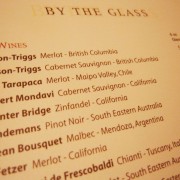Servers on Salary: Is Tipping Coming to an End?
As the debate over a fair minimum wage grows statewide, many restaurants have began participating in the anti-tipping movement by paying their servers a salary. Dirt Candy, a vegetarian restaurant in New York, has experimented with the idea by removing the line to tip and instead implementing a 20 percent “administrative fee” on every bill, which goes towards the employees of the restaurant. There are many benefits of the new payment system, but some traditional restaurants continue to object.
Tipping was a process introduced after the Civil War, when wealthier Americans traveled to Europe and witnessed the act in taverns and dining halls. The word “tip” is actually short for “to insure promptitude”. The aristocratic class embraced the custom in order to distinguish their elevated class. Since the 1940s, the normal suggested tip grew from 10 percent to 20 percent. In Europe, however, tipping is a foreign concept. Majority of the restaurants pay a higher wage to support their employees living situation. Some argue you that don’t receive the same high-service that you do in the states, while others like the idea of solely paying for the food itself.
Many restaurants view the anti-tipping movement as a sure way to make sure their servers are able to support themselves. There is no guarantee that a server will walk away with a sufficient amount of money when they depend on tips. A slow night or a customer who doesn’t tip may leave the server dependent on their hourly salary, some as low as $5 an hour.
Michael Lynn, a professor of consumer behavior and marketing at Cornell University’s School of Hotel Administration, claims that the act of leaving a tip is due to guilt. Tipping had became such a social norm that people feel obliged to leave money at the end of a meal to avoid judgement from others. This is supported by Lynn’s studies, which reveal that people leave the standard 15 to 25 percent tip every time they eat out.
Some argue that tipping is a way to reward good service. Tipping has always been viewed as an incentive for servers to work to the best of their abilities. But the question arises that if the majority of consumers leave the same, standard tip each time, then why should employees go above and beyond? Servers are less likely to provide a personalized experience, but instead, try to turn over as many tables as possible. There is less risk involved in hoping for a larger tip than serving as many tables as they can in one night. This leads to worse service, which leads to worse tips, a lose-lose situation for everyone.
When the service isn’t as expected, customers tend to punish the server by leaving a not-so-great tip. What they fail to realize, however, is that leaving a lower tip hurts the restaurant as a whole. Many establishments pool the tips to ensure that the busboys and cooks are fairly compensated as well. Amanda Cohen, owner of Dirt Candy, explains that punishing the server shouldn’t be in the hands of the consumer, but a duty taken on by the restaurant. The server should be evaluated by management, who can decide what steps to take further based off of the situation at hand.
Although prices may be higher in a restaurant that commits to the no tipping policy, customers can feel better knowing that the employees are being paid fairly. In a poll conducted by the Washington Post, 68% agreed that servers should be able to count on a consistent wage and that built-in service charges is better for diners. 55% continued to say that they would feel better about eating there because the servers were well-paid. However, Lynn warns that the normal consumer hardly takes into account tipping or service charges, therefore judge how expensive a restaurant is based off of their menu. Restaurants may lose potential customers that see the menu before understanding the anti-tipping philosophy.
- Sommelier Surge in Restaurants - August 7, 2015
- 3 Up-and-Coming Restaurant Industry Trends - August 6, 2015
- Millennial’s Impact on the Wine Industry - August 4, 2015






